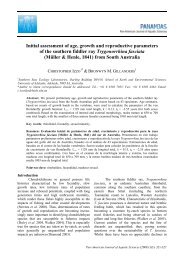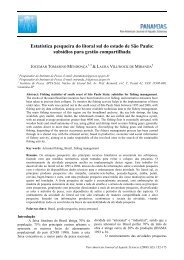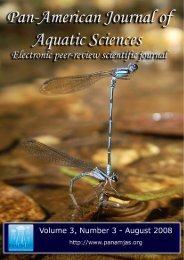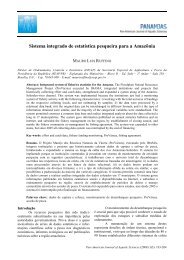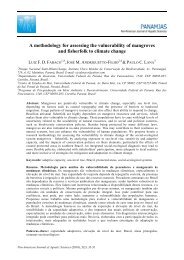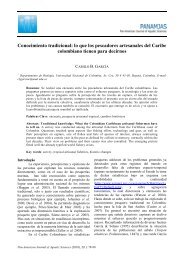Status of Eastern Brazilian coral reefs in time of climate changesZELINDA M. A. N. LEÃO, RUY K. P. KIKUCHI, MARÍLIA D. M. OLIVEIRA& VIVIAN VASCONCELLOSUniversidade Federal da Bahia, Centro de Pesquisa em Geofísica e Geologia, Instituto de Geociências. RuaBarão de Jeremoabo s/n, Campus Universitário de Ondina, Salvador 40170-115, Bahia, Brasil.E-mails: zelinda@ufba.br; kikuchi@ufba.br; mariliad@ufba.br; vivianvasconcellos@hotmail.comAbstract. Brazilian reefs comprise the largest and the richest reefs of the Southwestern AtlanticOcean. Indicators of reef vitality reveal that reefs located less than 5 km from the coastline, theinshore reefs, are in poorer conditions than those located more than 5 km off the coast, theoffshore reefs. The inshore reefs are the most impacted by the effects of eutrophic watersassociated with sewage pollution, high sedimentation rates and water turbidity, and the mostexposed to the effects of bleaching and infectious diseases. From 1998 to 2005, long-term seawater thermal anomaly events, equal or higher than 1ºC, were responsible for more than 30% ofbleached corals in the inshore reefs. In the offshore reefs of the Abrolhos area, bleaching wasmilder, but the reefs are strongly threatened by the incidence of diseases that have escalated inprevalence from negligible to alarmingly high levels in recent years. Although bleaching and coraldisease have not yet caused mass mortality in the Brazilian reefs, these natural disturbancesassociated with the effects of global climate changes and human-induced activities, could lead thereefs to higher levels of degradation.Keywords: Coral bleaching, Sea surface temperature anomaly, AbrolhosResumo. Estado dos recifes de coral da costa leste Brasileira em tempo de mudançasclimáticas. Os recifes de coral do Brasil são os maiores e mais ricos recifes do oceano AtlânticoSul-Ocidental. Indicadores da vitalidade dos corais revelaram que os recifes localizados menos de5 km da linha de costa, os recifes costeiros, apresentam condições inferiores aos recifes de altomar, que estão afastados mais de 5 km do continente. Os recifes costeiros além de estaremseveramente impactados pelos efeitos da eutrofização das águas, associada à poluição de esgotosdomésticos, altas taxas de sedimentação e turbidez, estão ameaçados pela ocorrência de eventos debranqueamento e doenças dos corais. De 1998 a 2005 eventos de longa duração das anomaliastérmicas da água do mar de 1ºC ou mais, foram responsáveis por mais de 30% do branqueamentonos recifes costeiros. Nos recifes de alto mar da área de Abrolhos, apesar dos eventos debranqueamento terem sido mais suaves, os recifes estão ameaçados pela incidência de doençascuja prevalência alcançou níveis alarmantes nos últimos anos. Embora os eventos debranqueamento e a ocorrência de doenças não tenham provocado, ainda, mortalidade em massados corais, estes distúrbios associados aos efeitos dos fenômenos climáticos globais e de açõesinduzidas pela atividade humana constituirão uma grave ameaça que poderá levar os recifes aníveis elevados de degradação.Palavras-chave: Branqueamento de coral, anomalia térmica da água superficial do mar, AbrolhosIntroductionIn the coastal zone of Eastern Brazil, coralreefs are one of the most prominent marineecosystems, comprising the largest and richest areaof reefs in all of the southwestern Atlantic Ocean.Studies during the last two decades have shown thatthese coral reefs are experiencing increasingdegradation due to a combination of large-scalenatural threats (e.g. sea level oscillations and ENSOevents), and of more local scale anthropogenicstressors, such as accelerated coastal development,Pan-American Journal of Aquatic Sciences (2010), 5(2): 224-235
Brazilian coral reefs in time of climate changes225reef eutrophication, marine pollution, tourismpressure, over-exploitation of reef resources,overfishing and destructive fisheries and, morerecently, the introduction of non-indigenous invasivespecies (De Paula & Creed 2004, Leão & Kikuchi2005, Leão et al. 2008). At the global scale, thereare many cases in which these threats have alreadycaused a reef phase shift away from corals (Riegl etal. 2009).In Eastern Brazil, several parameters of reefvitality, among them the living stone coral cover, thedensity of reef building coral species and of coralrecruits, and the abundance of macroalgae, indicatethat, overall, the reefs located closer to the mainlandare in poorer condition than those that are more than5 km from the coastline (Kikuchi et al. 2010). Alowering of sea-level that occurred after 5,000 yearsBP, along that part of the Brazilian coast, placed theinshore reefs closer to the coastline and mobilizedthe western continent-derived siliciclastic sedimenttoward the eastern reef systems. This event exposesthem to increased runoff and sedimentation andintense solar radiation, as well as threats induced byhuman activities (Leão & Kikuchi 2005).Bleached corals have been seen in EasternBrazil since the summer of 1982/1983 (Z.M.A.N.L.pers. observation), but the first published records ofcoral bleaching date from the summer of 1993/1994,after the occurrence of a worldwide El-Niño event(Castro & Pires 1999, 2001). Since then, there arerecords of bleached corals coincident with everyoccurrence of sea water temperature anomaly alongthis part of the Brazilian coast (Leão et al. 2008).There seems to be a strong linkage between coralbleaching and periods of elevated sea surfacetemperatures along the coast of Brazil. On the otherhand, coral diseases have flourished worldwide sincethe 1980s (Harvell et al. 1999, 2002, Rosenberg &Loya 2004), but only recently has the incidence ofcoral diseases in the Brazilian reefs increased(Francini-Filho et al. 2008). Both coral bleachingand diseases seem to be intensified by warming ofthe sea surface temperature, and they are affectingmostly the inshore reefs.This work presents a synthesis of the statusof the coral reefs from Eastern Brazil based on datacollected during the last decade. It was examined avariety of environmental factors in an effort todistinguish the dominant attributes on the intensityof bleaching. The combination of these studiesincrease the chances of making predictions concerningthe effects of the expected temperature increaseon reef organisms, and to set regional priorities forresearch and conservation of the reefs in the face ofglobal climate changes.Materials and MethodsStudy area: The Eastern Brazilian reefs arespread along about 800 km of the coastline of thestate of Bahia, between 12º and 18º S (Fig. 1). Thispart of the Brazilian coast has a tropical climate,with rainfall ranging from 1300 mm y -1 in itsnorthernmost part to a maximum of 2000 mm y -1in the southern region. Average air temperaturesrange from 23 ºC in the winter to 28 ºC in thesummer. The most significant wave front directionsare from the NE, E, SE and SSE. NE and E windinducedwaves have periods of 5 sec and heights of1.0 m, and SE and SSE wind-induced waves haveperiods of 6.5 sec and 1.5 m heights (Bittencourt etal. 2005). Spring tides vary from 1.7 m in thesouthernmost region to 3.0 m at the extreme north.The temperature of the surface water varies fromaround 24 ºC (winter) to 28 ºC (summer).Study reefs: The studied reefs comprise two groups:inshore and offshore. The inshore reefs are adjacentto the coast or a few kilometers from the shoreline(< 5 km). They include fringing reefs and shallowbank reefs, both in depths from 5 m to 10 m in thefore-reef zone and are not longer than 1 km. Theoffshore reefs consist of reef structures of variabledimensions, from a few meters up to 20 km, and arelocated more than 5 km off the coastline, at variousdepths. They include coral knolls, patch and bankreefs, and isolated coral pinnacles. Besides these,there are also oceanic shelf edge reefs that occur atthe border of the continental shelf, with widths up to3 km and a relief of about 30 m at depths of 50 m.These reefs must have started to grow earlier in theHolocene, at lower sea level stands, and are nowveneered with a deeper water community (Kikuchi& Leão 1998).Reef-building fauna: Brazilian reefs were builtby a low diversity coral fauna rich in endemicspecies (Laborel 1970). Twenty three species ofstony corals and five species of hydrocorals areregistered along the Brazilian coast, and eighteencorals and four hydrocorals occur on the EasternBrazilian reefs (Table 1). From these, six species areendemic of the Western South Atlantic waters, somehave affinities with Caribbean coral forms and someare remnants of a more resistant relict fauna datingback the Tertiary time, which was probablypreserved during Pleistocene sea level low stands ina refuge provided by the sea-mountains off theAbrolhos Bank (Leão et al. 2003). These archaicspecies are the most common forms in all studiedreefs. They are the three species of the genusMussismilia: M. braziliensis Verrill 1868, M. hispidaPan-American Journal of Aquatic Sciences (2010), 5(2): 224-235




